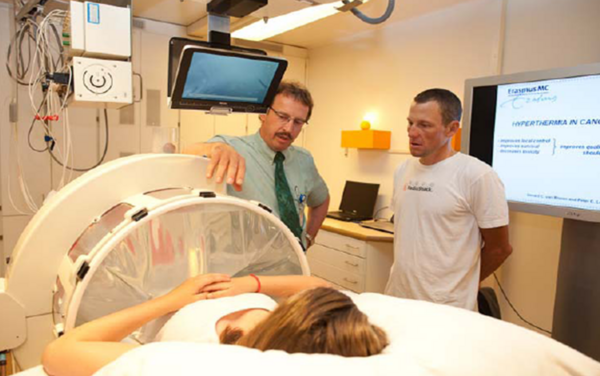
Background
During a hyperthermia treatment, tumor temperatures are raised to the range of 40 C-45 C. Within the hyperthermia unit of the Daniel den Hoed Cancer Center, around 160 new patients are being treated each year with hyperthermia to improve the clinical outcome from radiotherapy or chemotherapy.
In Rotterdam, we recently developed the HyperCollar applicator, which is specifically designed to heat cancer in the head and neck region. The HyperCollar has twelve antennas operating at 433 MHz and exploits interference for focusing heat energy to the tumor region. Heating is optimized using pre-treatment simulations based on electromagnetic and thermal simultation tools. Prediction of the temperature rise from the electromagnetic distributions, however, is difficult because thermal tissue properties vary substantially during treatment. Therefore, we work on integrating the hyperthermia applicator into a magnetic resonance imaging (MRI) scanner, which enables 3D (non-invasive) measurement of the temperatures in the patient. Using these MRI measurements, we can assess current heating quality without implanting cathethers and implement novel heating strategies for improving the effectiveness of the treatment.
Project Description
The graduation project is part of a long-term cooperation between the TU/e and the Daniel den Hoed Cancer Center. The purpose of the graduation project is to develop an active antenna array operating at 433 MHz that can be used within MRI scanners. For that purpose, the hyperthermia applicator needs to be transparent for frequencies below 150 MHz. To keep dimensions small, and for an optimum coupling of energy into the patient, the array must operate in an environment filled with low-loss (i.e. de-ionised) water. During the project, a new prototype will be developed that will be tested at the Daniel den Hoed Cancer Center.
Project organisation
The graduation project will be performed in close cooperation with Erasmus MC - Daniel den Hoed Cancer Center in Rotterdam. The actual work can be done in Eindhoven, in Rotterdam or both, depending on preference.
Contact
Prof.dr.ir. A.B. Smolders, a.b.smolders@tue.nl
M. Paulides, m.paulides@erasmusmc.nl